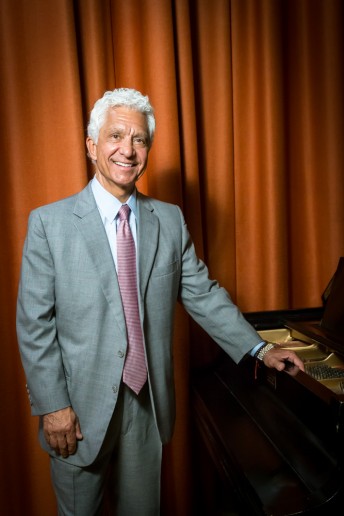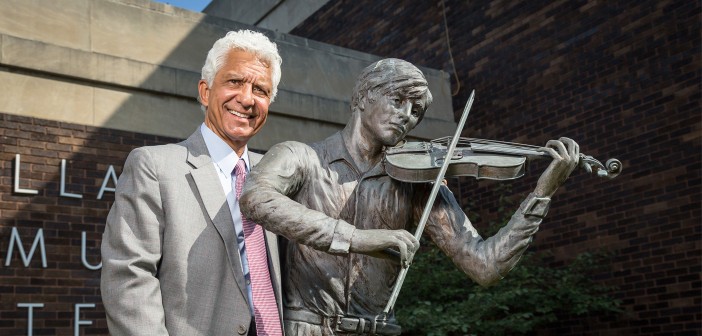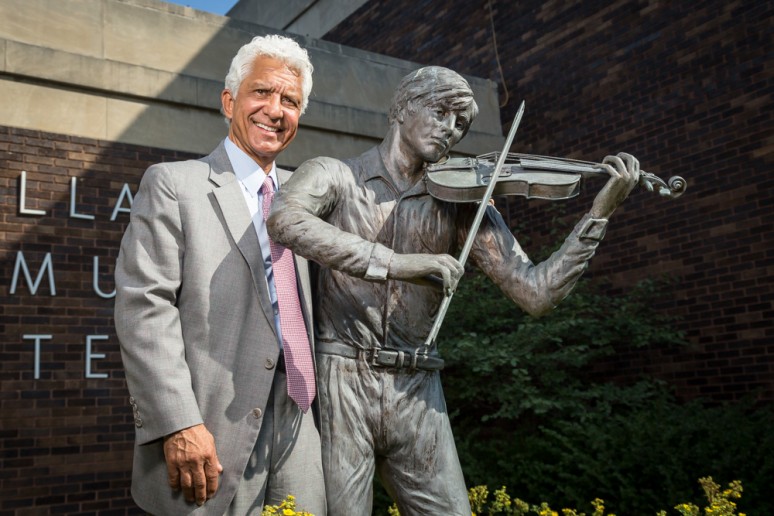Last month, Flint’s Cultural Center welcomed Rodney Lontine to the Flint Institute of Music as its new President and Chief Executive Officer.
Born and raised in Colorado, Lontine attended Western State Colorado University and earned a Bachelor of Arts degree in Business Administration, with a minor in Fine Arts. Since then, he’s had experience as a sales representative for a computer company during the computer revolution, as well as a top-level management position in Los Angeles. He then returned to Colorado and co-founded an advertising agency – Garrison Lontine Advertising – which grew to be one of the largest and most successful agencies in the region with offices in Denver, Dallas and Boston.
“All eyes are on this area, and there’s a lot of good that’s going to come out of it.”
Eventually, Lontine grew interested in doing non-profit work with health-related organizations, Goodwill Industries, and the arts. While sitting on the boards of various non-profits (including Board of Directors, Juvenile Diabetes Research Foundation; Board of Trustees, City of Englewood Arts; Board of Trustees, Englewood Cultural Arts Center Association; and is a founding member of the Board of the Music Appreciation Society), he became more involved in the process of redevelopment.
A firm believer in utilizing the arts as an engine for both economic and social growth, Lontine’s next career move was taking on the role of Executive Director and Chief Operating Officer for the Museum of Outdoor Arts (MOA) in Englewood, CO, where he served for 18 years. While at MOA, he was responsible for directing a multi-million dollar arts, education and entertainment venue, including – Fiddler’s Green Amphitheatre – an 18,000-seat outdoor facility for recording artists, orchestra, dance, film, theatre and other performances. He also worked with Live Nation and AEG Live to promote and host concerts and music festivals.
 “The arts are a positive change agent – they always have been,” Lontine says. “You take any city that is redeveloping, the arts move in and they bring in culture and music and restaurants, then it becomes the cool place to be. All eyes are on this area, and there’s a lot of good that’s going to come out of it. There’s an opportunity for the city to rise up. The world thinks they know what Flint is, now we need to shift the perception to what it really is.”
“The arts are a positive change agent – they always have been,” Lontine says. “You take any city that is redeveloping, the arts move in and they bring in culture and music and restaurants, then it becomes the cool place to be. All eyes are on this area, and there’s a lot of good that’s going to come out of it. There’s an opportunity for the city to rise up. The world thinks they know what Flint is, now we need to shift the perception to what it really is.”
From an emotional standpoint, Lontine is proud of what he was able to accomplish, by taking skills from the corporate environment to affect change in the non-profit world – and looks forward to having a similar impact at FIM.
“When I first looked at the Flint Institute of Music, what compelled me was Flint’s Cultural Campus – the concentration of the arts, the synergisms with all of the different types of arts and the facilities themselves,” Lontine says. “People need to know how lucky they are to have a place like this.”
One idea is to expand FIM’s outreach programs through collaborations with local youth clubs and community centers – bringing more of the programs to them, as reliable transportation is a limitation for some people. Lontine hopes to provide more outreach for children in the area, as involvement in music and the arts can help with other skills: critical thinking, collaboration, teamwork, self-confidence and literacy.
“The FIM has a long history and tradition of great programming,” Lontine says. “We are going to respect that tradition and history, but we’re also going to look forward and find ways to impact more people. It could include taking event opportunities to areas where the people typically wouldn’t have the chance to see a symphony or get involved with music.”
In addition, Lontine is focused on building the audience and all of the FIM’s programming, as well as enhancing the understanding of the symphony. “Symphonies are sometimes misunderstood as being stodgy or stuffy, but they are such a great gateway to so many things,” he says. “We’re trying to create the next generation of music- and orchestra-lovers. Symphonic music is kind of like appreciating a new sport; once you understand the rules, the game, and what everyone is doing, you become a fan. It’s very similar with an orchestra; once you understand the players and how they all interact, and what the conductor does, it means more. It touches you more.”
Lontine himself can play the drums, and enjoys all music genres. “Music is like food; if it’s good, it doesn’t matter what kind of food it is – you just know it is good,” he explains. “It doesn’t matter if it’s jazz or folk or hip-hop – when it’s good, it’s good. Music can cross all ages and socioeconomic boundaries.”
As for the future of the FIM and the Cultural Center, Lontine is optimistic. “I am hopeful that more people will understand what’s going on here,” he shares. “I’m hopeful that the FIM programs are part of it and contribute to the redevelopment efforts by providing an education component and an imaginative component. As the campus grows, it will become a place; you may be going to see the symphony, but you’ll say you’re going to the ‘Cultural Center.’”
Photography by Eric Dutro















